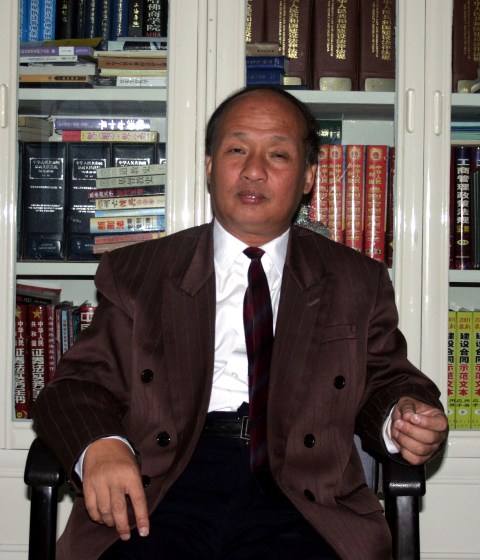郑恩宠

Under heavy surveillance and sporadic soft detention
Zheng Enchong was born on September 2, 1950. During the Cultural Revolution, he was sent to Heilongjiang province in the far north of China as part of the army corps. When he returned to Shanghai in 1973, he worked in a factory during the day until he was able to complete his secondary education. He studied economics at Fudan University, and taught himself law. In 1993, he passed the bar and became a licensed lawyer. In 2005, Mr. Zheng received the German Association of Judges’ Human Rights Award. In 2008, he was one of the original signers of Charter 08, a manifesto calling for fundamental changes in China, including an independent legal system, freedom of association, and the elimination of one-party rule.
Mr. Zheng’s first clients included over 500 families who were displaced without compensation during Shanghai redevelopment projects. In the process of defending their property rights, Mr. Zheng publicly suggested that prominent Shanghai officials were approving redevelopment projects in order to unlawfully enrich themselves.
In 2001, Mr. Zheng’s license was invalidated by the Shanghai authorities. Although he appealed the decision, his appeal was never ruled on. Despite the invalidation of his legal license, he continued taking cases. According to Chinese law, any citizen can represent another in court, although a personal representative has fewer privileges than a lawyer. In 2003, Mr. Zheng agreed to provide legal advice to a group of dispossessed Shanghai residents who accused local officials of having taken bribes from developers as part of a scheme to evict the residents. Soon thereafter, Mr. Zheng was arrested and charged with “illegally providing state secrets outside of the country” under Criminal Law article 111; the two documents at issue, which he had faxed to the advocacy organization Human Rights in China, were his own personal account of police actions and a newspaper article about a protest.
Mr. Zheng was found guilty and sentenced to three years imprisonment, followed by a year of deprivation of political rights. During his imprisonment, he was forced to work 14 hours a day, was severely beaten, and was sometimes held in solitary confinement. As a result of his criminal conviction, his license to practice law was also permanently revoked.
Mr. Zheng was released on June 5, 2006 after serving his full sentence. He has continued to provide legal advice to people in housing disputes. His continued support for housing dispute cases has angered local authorities, who have responded with harsh extra-judicial measures. For example, plainclothes officers are stationed on the landing outside his door, and police surveillance cameras tape visitors at the door, in the hallway, and in the elevator of his building. Whether or not he is allowed to leave his apartment is unpredictable.
On July 24, 2007, Mr. Zheng and his wife tried to attend the trial of a developer charged with fraud and bribery. At the courthouse, Mr. Zheng was surrounded by six police officers, who knocked him to the ground, dragged him away, and beat him for an hour, before placing him and his wife under house arrest at the home of a relative until the trial ended.
Since his release from prison in 2006, Mr. Zheng has been summoned for questioning by the police over 70 times, his home has been searched frequently and his personal items have been confiscated. One of the most egregious incidents occurred on June 17, 2009 when police stripped him of his clothing and held lit cigarettes to his lips and eyelids. After being summoned and questioned by police on December 30, 2009, Mr. Zheng wryly observed that the five hours of questioning he had endured on that occasion were much shorter than the 10 to 12 hour interrogations to which he had become accustomed.
On May 24, 2013, Mr. Zheng was informed that he and his wife would be allowed to travel to Hong Kong, where he had been invited to speak at Hong Kong Chinese University. After almost seven years of de-facto house arrest, Mr. Zheng suspects that this sudden increase in freedom is part of an attempt to ease tensions before President Xi Jinping’s meeting with U.S. President Barack Obama in early June.
In 2016, Mr. Zheng was abducted by local police in Shanghai and taken to a resort island, where he was offered luxury treatment in return for his political allegiance. Although Mr. Zheng continues to practice law, he is kept under 24-hour surveillance.
Last updated July 18, 2018
Other Resources
Zheng Enchong, “Xin Chai Qian Tiao Li Dao Tui Mei You Chu Lu” (“New Demolition Regulations are a Step Back, There’s No Way Out”), Epoch Times, Jan. 2, 2011, available at http://epochtimes.com/gb/11/1/2/n3130691.htm.
Human Rights Council, Report of the Special Rapporteur on the independence of judges and lawyers, Leandro Despouy, Addendum, Situations in specific countries or territories, ¶89, U.N. Doc. A/HRC/8/4/Add.1 (May 28, 2008), available at http://www2.ohchr.org/english/bodies/hrcouncil/8session/reports.htm.
Michelle Yu, “Shanghai Mourns Fire Victims with Flowers,” Epoch Times, Nov. 26, 2010, available at http://www.theepochtimes.com/n2/content/view/46565/.
Cara Anna, “Lawyer’s Plight Highlights Perils of Fighting China’s System,” Associated Press, May 14, 2008, available at http://www.law.com/jsp/law/LawArticleFriendly.jsp?id=1202421351540.
Edward Cody, “China Uses Heavy Hand Even With Its Gadflies,” Washington Post, April 13, 2008, available at http://www.washingtonpost.com/wp-dyn/content/article/2008/04/08/AR2008040803274.html.
The Epoch Times, “In China, State Intimidation Can Come with Wine and Lobster” https://www.theepochtimes.com/confined-shanghai-rights-lawyer-recounts-case-of-forced-rr_2125339.html



 Committee to Support Chinese Lawyers
Committee to Support Chinese Lawyers